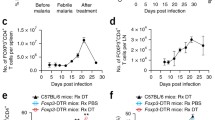Abstract
Infection with malaria parasites frequently induces total immune suppression, which makes it difficult for the host to maintain long-lasting immunity. Here we show that depletion of CD4+CD25+ regulatory T cells (Treg) protects mice from death when infected with a lethal strain of Plasmodium yoelii, and that this protection is associated with an increased T-cell responsiveness against parasite-derived antigens. These results suggest that activation of Treg cells contributes to immune suppression during malaria infection, and helps malaria parasites to escape from host immune responses.


Similar content being viewed by others
References
Richie, T.L. & Saul, A. Nature 415, 694–701 (2002).
Good, M.F., Kaslow, D.C. & Miller, L.H. Annu. Rev. Immunol. 16, 57–87 (1998).
Plebanski, M. et al. Immunity 10, 651–660 (1999).
Chen, Q. et al. Nature 394, 392–395 (1998).
Su, X.Z. et al. Cell 82, 89–100 (1995).
Baruch, D.I. et al. Cell 82, 77–87 (1995).
Urban, B.C. et al. Nature 400, 73–77 (1999).
Williamson, W.A. & Greenwood, B.M. Lancet 1, 1328–1329 (1978).
Viens, P., Tarzaali, A. & Quevillon, M. Am. J. Trop. Med. Hyg. 23, 846–849 (1974).
Ho, M. et al. J. Immunol. 141, 2755–2759 (1988).
Shevach, E.M., McHugh, R.S., Piccirillo, C.A. & Thornton, A.M. Immunol. Rev. 182, 58–67 (2001).
Shevach, E.M. J. Exp. Med. 193, F41–F46 (2001).
Sakaguchi, S. Cell 101, 455–458 (2000).
Belkaid, Y., Piccirillo, C.A., Mendez, S., Shevach, E.M. & Sacks, D.L. Nature 420, 502–507 (2002).
Yoeli, M., Hargreaves, B., Carter, R. & Walliker, D. Ann. Trop. Med. Parasitol. 69, 173–178 (1975).
Acknowledgements
We thank M. Tsubosaka, N. Kanbe, K. Ishii and S. Hamano for assistance with experiments, and J.R. Dorfman for helpful comments. This work was supported by grants-in-aid from the Ministry of Education, Culture, Sports, Science and Technology in Japan and the Industrial Technology Research Grant Program from NEDO of Japan (to K.Y.). The experiments were approved by the animal care committee of the University of Tokushima.
Author information
Authors and Affiliations
Corresponding author
Ethics declarations
Competing interests
The authors declare no competing financial interests.
Rights and permissions
About this article
Cite this article
Hisaeda, H., Maekawa, Y., Iwakawa, D. et al. Escape of malaria parasites from host immunity requires CD4+CD25+ regulatory T cells. Nat Med 10, 29–30 (2004). https://doi.org/10.1038/nm975
Received:
Accepted:
Published:
Issue Date:
DOI: https://doi.org/10.1038/nm975
- Springer Nature America, Inc.
This article is cited by
-
Dynamics of Plasmodium berghei NK-65 parasitaemia and CD3+CD4+CD25+Fox-p3+ T-regulatory cells in experimentally induced malaria during early, mid, and late-pregnancy in BALB/c mice
Indian Journal of Microbiology (2023)
-
CD4+ICOS+Foxp3+: a sub-population of regulatory T cells contribute to malaria pathogenesis
Malaria Journal (2022)
-
T cell-mediated immunity to malaria
Nature Reviews Immunology (2019)
-
Regulatory T cells impede acute and long-term immunity to blood-stage malaria through CTLA-4
Nature Medicine (2017)
-
Cysteine protease inhibitor of Schistosoma japonicum - A parasite-derived negative immunoregulatory factor
Parasitology Research (2017)





